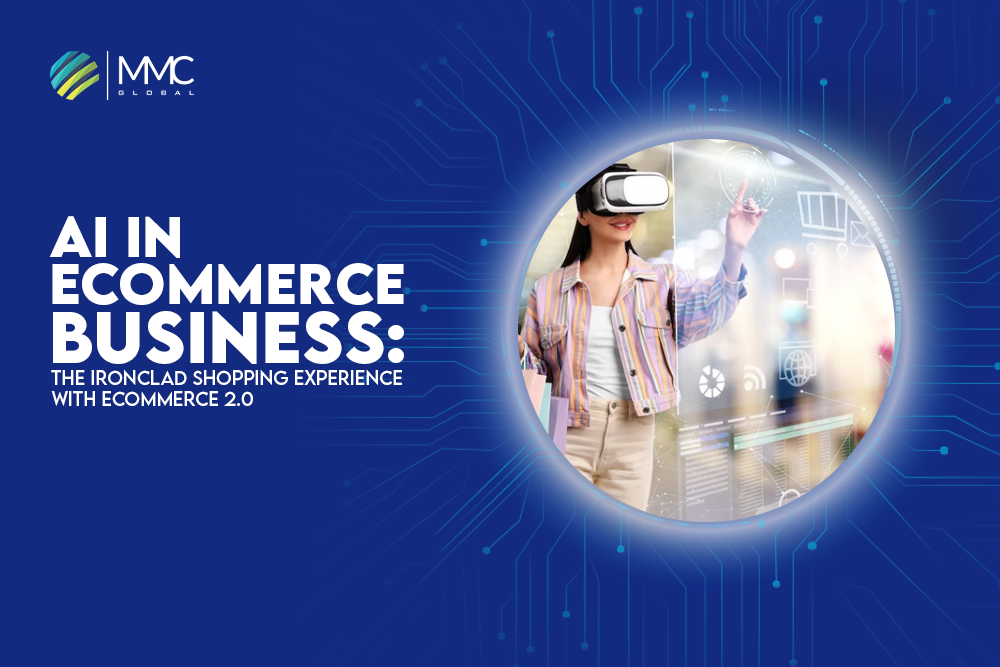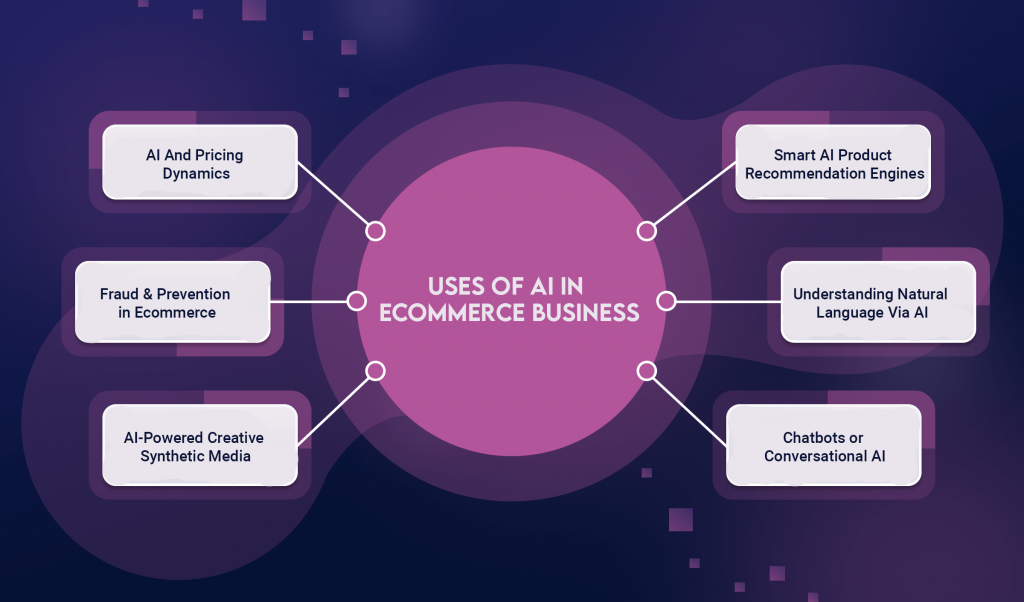AI In Ecommerce Business – The Ironclad Shopping Experience With Ecommerce 2.0


Ecommerce businesses are the fastest growing landscape and highly on-demand in today’s era. The rapidly evolving eCommerce business to eCommerce 2.0 results from ongoing optimization in technology that helps online ecommerce business owners expand globally. AI in eCommerce is one of the most highlighted eCommerce trends that revolutionized eCommerce business from 0 to hero.
In fact, the AI-enabled eCommerce market is projected to reach $16.8 billion by 2030, growing at a rate of 15.7% CAGR in the next 8 years. Moreover, another report showed that 84% of eCommerce business owners are working to implement AI to optimize eCommerce operations.
The increasing number of AI in eCommerce implementation surely gives you goosebumps if you are not certain yet about AI’s progress. Well, before implementing AI in your eCommerce business, it may be unexciting for you, but the proof is in the pudding.
Let’s look at the real-world use cases of AI in the eCommerce business landscape.
6 Practical Uses of AI in Ecommerce Business

AI And Pricing Dynamics
Setting pricing based on consumer behavior and previous buying patterns emphasizes providing a dynamic pricing structure. Businesses build effective pricing strategies to allocate competitive yet effective pricing that helps increase their sales without making much effort.
These pricing settings are based on large datasets, which is why AI is the perfect pick to deal with them. Price changes are incorporated with datasets and a few factors, including supply and demand, market trends, competition and industry standards, consumer expectations, website and consumer behavior, and inventory level.
With the help of self-improving complex algorithms run with one of the AI’s subsets, Machine Learning is now possible. However, if you wonder how AI works in dynamic pricing, you need to know more. The built-in feature of self-taught datasets in Machine Learning also helps optimize pricing data according to the optimization variables. The AI algorithms identify these variables, including Price management automation, Profitability analysis, Price/trend forecasting, Price competition marketing analysis, and Customer analysis for personalized pricing.
Fraud & Prevention in Ecommerce
The risk of fraud in online ecommerce can be very common if you do not put barriers across your systems. AI helps you better in the prevention of threats and any other suspicious activity that occurs before the time. AI easily detects unusual activities such as irregular behavior of transactions, unexpected buying, email spam, etc.
Moreover, AI works in fraud detection by using machine learning and data analysis techniques to identify patterns, anomalies, and indicators of fraudulent activity within large datasets. Machine learning algorithms can be trained on past data to build predictive models. These models can forecast potential fraudulent transactions or behaviors based on known patterns, helping organizations take proactive measures.
AI-Powered Creative Synthetic Media
Synthetic media refers to media materials, such as images, videos, sounds, or any other form of content that has been generated. Ecommerce marketing needs immersive attention to spread awareness, gather leads, and find potential customers. To convey their brand messages to the public, business owners use synthetic media that helps viewers attract.
Read more: Ecommerce Marketing Trends That You Need To Watch Out
In this regard, AI comes to the rescue with its creative ideas and auto-generated media materials. Furthermore, AI is revolutionizing in detecting human language, which leads AI to understand, respond, and act as per human command. Many AI-powered tools (like ChatGPT, Bard, etc.) help create media content by only giving a single prompt.
The more clear your prompt is, the more relevant you can generate media content within a second. AI automates content production, whether you need an image that captivates viewers or a well-versed caption that defines your product/services.
Smart AI Product Recommendation Engines
AI is not only smart but also very intelligent; it saves previous interactions in its memory. The smart AI product recommendation engine helps online buyers view personalized recommendations that match their personality and style. In fact, this recommendation engine works on previous interactions, consumer behavior, and other online browsing activities.
With this AI product recommendation, AI enhances the power of personalization for individual customers. Personally, knowing your customer to deliver a better experience is a key component to play with human psychology. However, the backend algorithms effectively run on datasets and show products and services relevant to the users’ needs.
Moreover, these engines collect and process data on what users search for, click on, purchase, and even how much time they spend on specific products. Through this analysis, the AI system identifies patterns and correlations, enabling it to generate personalized product recommendations for each user. As users interact with the platform, the recommendation engine continually refines its predictions, providing increasingly relevant and tailored product suggestions, ultimately enhancing user engagement and driving sales.
Understanding Natural Language Via AI
AI is now capable enough to understand and respond to human language. Similarly, a subset of AI, Natural Language Processing, helps understand searchers’ phrases to show relevant products in its top searches. AI genuinely relies on keywords by correcting spelling mistakes and making context.
Sometimes, AI stimulates human queries by predicting searches and showing search snippets. AI in eCommerce is about understanding prospects’ needs and guiding them to relevant items that fulfill their demands.
AI can show results on keywords, full phrases, or even incomplete prompts. Furthermore, it determines patterns and connects links between the prompts to propel the meanings of unstructured texts.
Chatbots or Conversational AI
Without chatbots, today’s eCommerce business is incomplete. Chatbots are the kind of software that helps companies automate customer support by providing trained and well-versed chatbots. It helps respond to human queries within a second and enhances interaction whenever users visit your website.
It can be accessible 24/7 and respond to multiple users simultaneously, regardless of where they belong. AI chatbots can boost the online shopping experience by embedding various marketing touchpoints. In fact, you can embed AI chatbots on your website and social media profiles such as Facebook Messenger, Facebook comments, WhatsApp, Telegram, Instagram, etc. You can centralize data by making an omnichannel chatbot solution and keep your users entertained with your marketing campaigns.
Not only can it play an automated customer support agent, but it also helps the marketing and selling department by streamlining interaction in the buying and selling journey. In fact, 1 out of 5 consumers are willing to purchase goods from a chatbot.
How AI In Ecommerce Can Implement Effectively
Implementing AI needs professional help with professional AI engineers and effective strategies illuminating success. AI is a broad technology where complex algorithms occur. To make effective AI solutions for eCommerce, MMC Global can help you better.
However, we have on-demand AI professionals specializing in Artificial Intelligence and Machine Learning technology. Our vast portfolio of AI-based projects will help you recognize our expertise in the domain of AI, which builds Next-gen solutions.
Our future-proof customized solutions deliver a secure ecosystem by amalgamating your favorite features. We focused on AI applications security and compliance. It’s important to note that while AI can be a powerful tool for fraud prevention, it is not a silver bullet. Combining AI with other security measures, such as multi-factor authentication, encryption, and employee training, is essential for comprehensive fraud prevention. Our experts know how to collaborate with other futuristic technologies.
Wrapping Up
AI can play a significant role in fraud prevention by leveraging its ability to analyze large amounts of data, detect patterns, make real-time decisions, and much more. By implementing AI in eCommerce, you can deliver an ironclad shopping experience to your customers and build an effective experience for your marketing campaigns.
Now, tracking customer buying journeys, predicting sales, monitoring consumer behavior, securing payment, and even fortifying data can be possible with the help of AI. Let’s execute your next journey with AI and let the users give eye-popping experiences from your best ecommerce business.
In this article
Toggle


